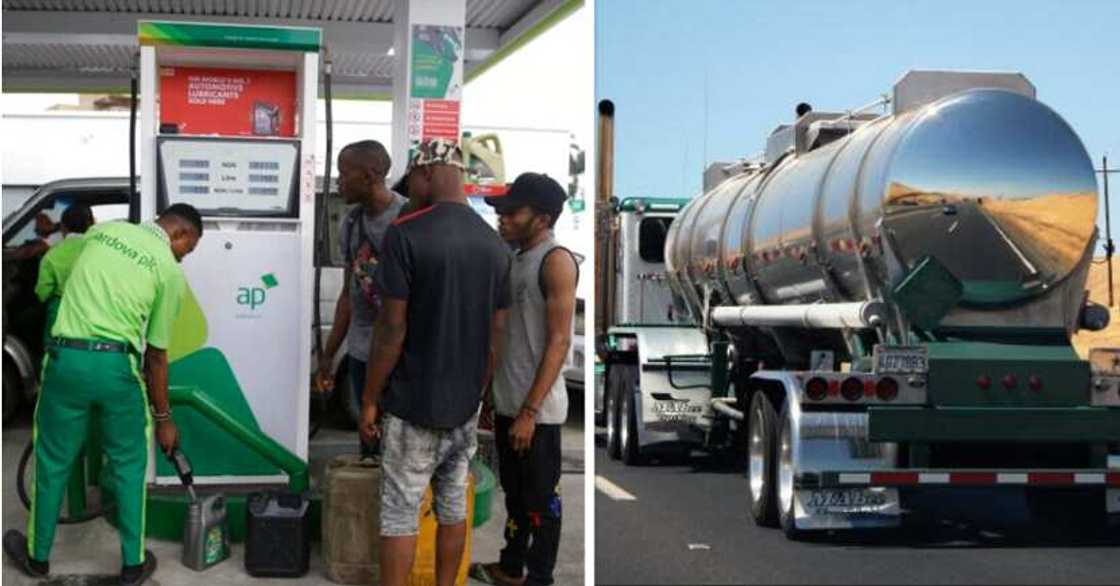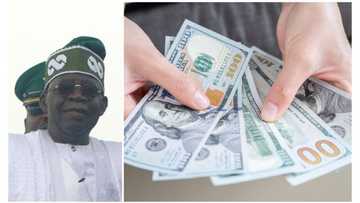Petrol Price to Increase Above N700 Per Litre: There Are 4 Reasons the Change Is Happening Soon
- Petrol prices are set to increase even further in the coming days and could rise to as high as N720 per litre
- Already, at N600 per litre, Nigerians are finding it difficult to afford essential commodities and transportation in their day-to-day lives
- Four reasons have been identified as the cause for the soaring petrol prices across the country
Unlock the best of Legit.ng on Pinterest! Subscribe now and get your daily inspiration!
There are strong indications that filling stations across the country are set to increase the pump prices of Premium Motor Spirit, popularly called petrol, in the coming days, adding to the burden of already stretched Nigerians.
The proposed new pump prices are set to be adjusted from the current N580 and N617 per litre to around N680/litre and N720/litre.

Source: UGC
If implemented, the new round of increases will be the third within 10 weeks since the announcement of the removal of the petrol subsidy.
Reasons for new pump prices
Legit.ng has provided a breakdown of why the prices are set to increase anytime soon.
PAY ATTENTION: Follow us on Instagram - get the most important news directly in your favourite app!
No more subsidy
One primary reason for the changes in petrol prices is the absence of subsidies on petroleum products in Nigeria.
You may recall President Bola Tinubu, in his inaugural speech, announced the removal of the subsidy, opening the doors for market forces to determine pump prices.
This no-subsidy regime implies that Nigeria is now exposed to international oil prices.
Global crude oil prices
One primary reason petrol prices are increasing is global crude oil prices. You will recall that President Bola Tinubu, in his inaugural speech, announced that there would be no more extended fuel subsidy, opening the doors for market forces to determine pump prices.
Therefore, when crude oil prices increase, Nigerians must pay more.
Checks by Legit.ng show that Brent crude, the international oil price benchmark, increased from $76 per barrel in June 2023 to $86 per barrel as of Monday, August 14.
This means Nigerian oil marketers looking to restock have to pay more to import.
Vanguard reports that the landing cost of petrol has risen month-on-month, MoM, by 37.4% to N632.17 per litre in July 2023 from N460 per litre in June 2023.
Naira depreciation
Since the last pump price increase, Naira has depreciated against the US dollar by about 6.5% in the official market and 25% in the parallel market.
Legit.ng spoke to Chinedu Okoronkwo, the Independent Petroleum Marketers Association of Nigeria (IPMAN), and he confirmed the imminent price increase due to naira depreciation.
His words:
"As long as the dollar keeps rising against the naira in the foreign exchange market, the price of fuel in the country will continue to increase."

Read also
FG's exchange rate unification yields results as Nigeria earns $2.55 billion as forex inflow in 2 months
If the exchange rate continues to hover between N910 to N950 per dollar in the parallel market and closer to N800 in the official market, the price of petrol will rise.
Scarcity of foreign exchange
Oil dealers seeking to import petrol are facing a need for more foreign exchange (forex) to facilitate the importation of petrol.
The forex shortage prevents dealers from securing the necessary forex for the commodity.
Punch reports that oil marketers are now considering halting importation over the difficulty of getting forex.
If this happens, it will leave only NNPC as the sole importer and could lead to other marketers who manage to secure the product to raise prices.
Good, bad news for Nigeria as global crude oil prices rise
Meanwhile, in another report, Legit.ng revealed that global crude oil is now nearing $90 per barrel and is trading at the highest since 2023.
While this increase should be good news for an oil-producing country like Nigeria, it is not good news for its citizens.
Not only is Nigeria still struggling to meet its production quota, but the removal of the fuel subsidy and lack of working refineries foretell an increase in petrol pump prices.
Source: Legit.ng




